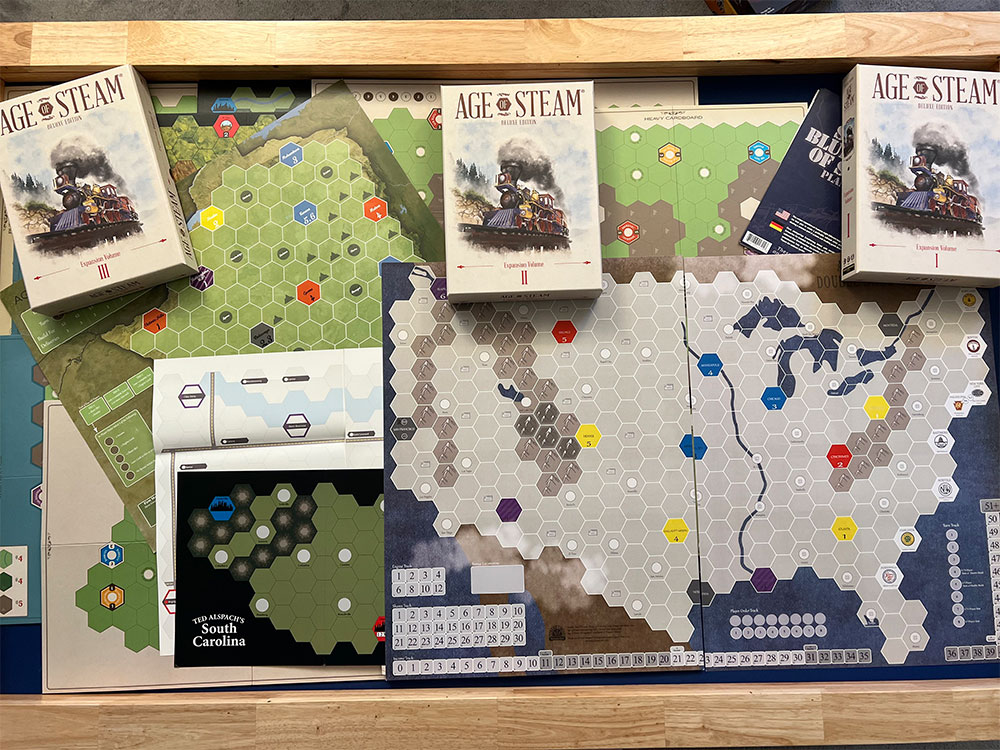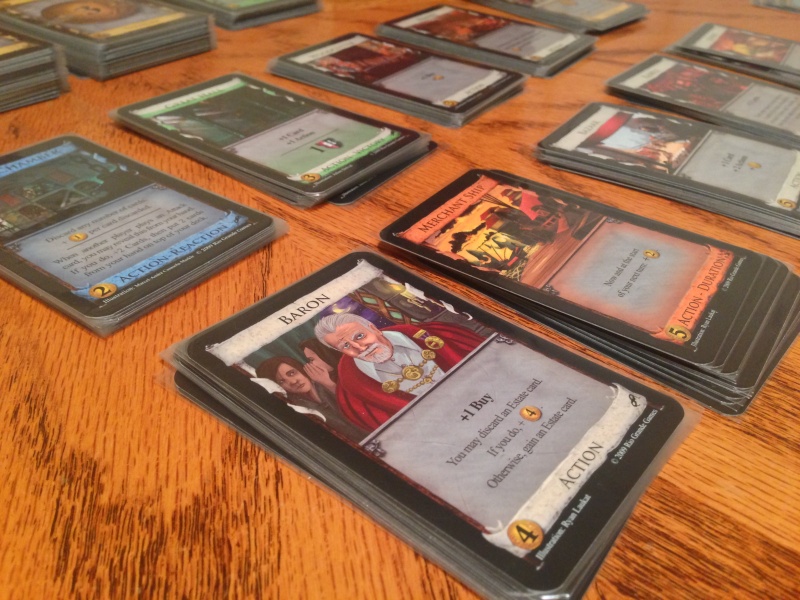 Reviewing one’s favorite game of all time is not the simplest of tasks. On the one hand, it’s rather quite simple to put to paper exactly what makes it tick; on the other, explaining such gushy emotions can be tricky. Shaping the thoughts of love into a mathematical formula can lead to mixed results: I give pizza 10/10 because even bad pizza is ok, but I give my spouse a 9/10 because they kick me in their sleep. And yet, I am attempting this process here today anyway so that you can learn the true beauty that is Age of Steam.
Reviewing one’s favorite game of all time is not the simplest of tasks. On the one hand, it’s rather quite simple to put to paper exactly what makes it tick; on the other, explaining such gushy emotions can be tricky. Shaping the thoughts of love into a mathematical formula can lead to mixed results: I give pizza 10/10 because even bad pizza is ok, but I give my spouse a 9/10 because they kick me in their sleep. And yet, I am attempting this process here today anyway so that you can learn the true beauty that is Age of Steam.
Gameplay Overview:
In every round of Age of Steam, players follow an order of operations in the hopes of increasing the value of their railroad empire. To increase that value (essentially your Victory Points), they must deliver goods cubes from their source city to a city of a matching color. In order to deliver these goods cubes, they must build a track from city to city. In order to afford that track, they must deliver goods cubes to earn income.
If this sounds like an inescapable economic ouroboros, don’t fret, as at the start of any round, you can take out loans, even if it’s the first round of the game. All that means is that later on in the round (and each and every round thereafter), during an Expenses step, you just have to pay some interest on that loan.
Don’t panic, though! Each round players will each get to choose one rule breaker or bonus to help them towards their goals. Will you decide to upgrade the power of your train? Increase how many track pieces you can play? Or will you place an entirely new city out onto the board? The choice is yours!… from whatever is leftover from the other players’ choices.
See, in addition to everything else that happens in one round of Age of Steam, there is an auction for turn order. This turn order, by default, determines the ordering for the following: choosing your power, laying your track, and delivering your goods. So how important is it for you to go early this round, and how important is it for everyone else?

Game Experience:
Age of Steam is one of the sharpest board games I’ve ever played. Nearly every phase in a round has the ability to send players into a downward spiral. Not taking out enough loans could lead you too short to pay for, well, many things; bidding too low in the turn order auction can lead you to miss out on the rule breaker you need, and bidding too high can lead you to be short of cash; not laying your track properly or having enough money to pay for the track you need can lead to missing out on making any deliveries in a round.

What saves the game from being absolutely miserable is that you are playing with human beings. I have played games of Age of Steam against people who have been playing it for 20 years and beat them because they made missteps. Their mistakes lead to their downfall, with my own actions and interactions with them taking second fiddle to their demise. If they play better, then I lose.
Now, it is impossible to talk about Age of Steam without touching on its most talked about wart: the random goods cubes. When players make a delivery from one city to another, the cube that gets delivered is removed from the map. To help refill the map as the game is being played, once a round there is a Goods Growth phase where one player will roll some dice to generate more cubes out onto the board. These cubes are shown on a Goods Growth chart so that players know exactly what cubes will be coming out onto the board. When two “3”s are rolled, then two cubes in the “3” column are added onto the city that has the “3” on it.

To highlight the randomness at play here: the goods cubes are laid out on the Goods Growth chart during set-up for all players to see, but only when that number is rolled during Goods Growth will they get added to the map. This randomness in an otherwise open-information game of this difficulty and complexity may be off-putting to some, and I respect that. For me though, it is what saves the game from being a predictable experience where players must rely solely on other’s mistakes to succeed. The randomness of the goods keep the game feeling fresh and engaging from start to finish.
Speaking of feeling fresh, Age of Steam’s longevity for fans of the game is its seemingly endless pool of maps. There have been 100+ professionally produced maps for the game over its 20-year history, with hundreds more hobby-level, homemade maps for players to explore. What’s so beautiful about these alternative maps is how much or how little they can change the game. The simplest maps will not change a single rule, whereas others will, for example, take place in the Sahara Desert where you must have delivered blue cubes (water) before you are even allowed to build in the desert (I hear it’s quite hot this time of year).

Final Thoughts:
If you have not taken the time to play Age of Steam before, I cannot recommend it to everybody. If you are a gentle gamer who likes player tableaus and being left alone, run as fast as you can. However, if you have enjoyed some of Martin Wallace’s games like Brass: Lancashire or Brass: Birmingham, then you owe it to yourself to try it out. Worst case you don’t like it, best case I’ll see you in Kansas City for Age of Steam Con.
Final Score: 5 Stars – A knife fight in 100+ phone booths. Stay away if you suffer from Zariphobia.
 Hits:
Hits:
• Tight economy where every dollar counts
• Meaningful player turn order auction
• Interactive route laying and goods delivering
• 100+ maps
Misses:
• Random goods refilling
• Unforgiving to simple mistakes
• Player Elimination is possible, if unlikely






















